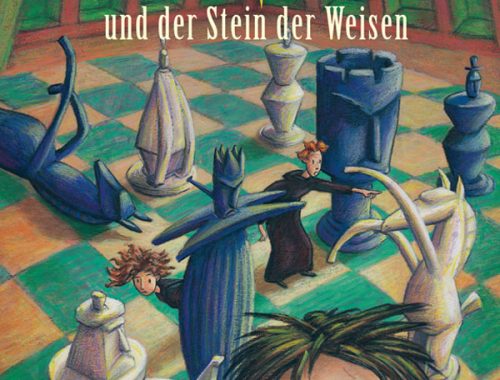Back at last to the Trilingual Harry Potter Reread! When last we left Harry Potter and the Philosopher’s Stone, Harry had been introduced to Snape–who is, of course, Harry’s primary nemesis amongst the teachers. But he’s got another one amongst the students, and we’re about to have more camera time on Harry and Draco Malfoy going ‘grr’ at one another. As you do.
General Commentary
As the chapter opens we get more about how everybody Harry meets is constantly talking about Quidditch, which leads to an amusing little exchange Ron has with another student, Dean, about the virtues (or lack thereof) of football. Speaking as someone who has zero interest in sports of any kind, I do have to grudgingly allow that Ron’s argument re: how on earth a sport where no one’s allowed to fly could be interesting does have some merit.
We also get a little bit of Draco targeting poor Neville, just to demonstrate that he’s a little asshole to people who aren’t Harry too. I mean honestly, here’s Neville being happy for once because oh hey look, his Grandma sent him a shiny thing! And what does Draco do but come along and snatch the Remembrall away from him.
Fortunately for Neville, Professor McGonagall is on the case. Pro tip, Draco: when McGonagall is one hundred and ten percent done with your bullshit and the school year has barely even started, it might be wise to re-evaluate your life choices.
But of course he doesn’t, because this is Harry Potter’s story and Harry needs a student nemesis, and that nemesis is Draco.
Which brings us to the initial flying class, taught by Madame Hooch–and Neville breaking his wrist, which precipitates the teacher conveniently having to take him out of the scene. Props to Parvati Patil for sticking up for Neville. But the main action here is all about Harry having to go after Malfoy in the air. Only, surprise! Flying after Madame Hooch told them not to not only doesn’t get Harry expelled, it gets him pegged by McGonagall to be the new Seeker for Gryffindor’s Quidditch team. It’s good to be the title character of the story, innit?
(Pause whilst I take a moment to wonder who exactly “Gregory the Smarmy” was, and why he gets to have a statue at Hogwarts!)
Draco’s undeterred, however, and challenges Harry to a wizard’s duel. Which leads Harry and Ron to the beginning of a long and honorable tradition of sneaking out of the Gryffindor rooms after hours, accompanied by Hermione and Neville (neither of whom were invited, but who show up because Plot). And of course Draco’s actually full of it, using this alleged duel as a trap to get Harry and his friends caught out in the corridors.
Our four young heroes narrowly evade Peeves the poltergeist and Filch the caretaker–only to stumble into the forbidden corridor on the third floor. Which, to their alarm, contains a very large three-headed dog.
And it’s sharp-eyed, sharp-witted Hermione who points out, once they make it safely back to the Gryffindor common room, that said dog was standing on a trapdoor. Thereby cluing Harry in about where the mysterious item moved out of Gringotts must have gone. How convenient! Also, I really do love Hermione’s line about how Harry could have gotten them all killed–or worse, expelled.
Two Countries Separated by a Common Language
The “football” debated by Ron and Dean at the beginning of the UK edition’s chapter is of course “soccer” in the US edition.
This isn’t something that’s different between the UK and US editions per se: Madame Hooch is Madame Hooch in both editions. But as a US-born reader, particularly one from the South, I hear “hooch” and I think “alcohol”. I don’t know if Rowling was aware of that connotation when she named the character, but it sure does put an interesting spin on her.
Five Things About the French Edition
In the bit at the beginning where it’s mentioned that Ron likes to tell a story about almost colliding with a hang glider, the French word used is “deltaplane”.
I knew the word “revanche” means “revenge”–but it’s used in the phrase “en revanche” in the paragraph that talks about Neville’s lack of experience with brooms. This is apparently the equivalent of “on the other hand” in English.
When Draco gets caught by McGonagall trying to swipe the Remembrall, in French, Draco says “C’était simplement pour jeter un coup d’œil”. This struck me since all he says in English is “Just looking”. But this longer French phrase is essentially saying the same thing; “jeter un coup d’œil” is to “have a quick look”.
A couple of the insults that get winged at poor Neville in French are “mollasson” (big lump) and “pleurnichard” (crybaby).
“Tais-toi” and “taisez-vous” are two different levels of formality for the same phrase–i.e., “be quiet” or “shut up”. The first is Parvati snapping at Draco, and the second is McGonagall telling Ron to keep his mouth shut as she hauls Harry off. I recognize the verb here from “se taire”, which I’ve learned via SuperMemo, and which means “to keep quiet”.
French Worldbuilding Terms
Neville’s Remembrall is called “un Rapeltout” in French, which is a pretty much direct translation.
Ah, Madame Hooch is Madame Bibine in French. And if you don’t have a French vocabulary, “bibine” is “cheap wine”. Which tells me that even if Rowling didn’t get the American connotation of “hooch”, the French translator absolutely did. 😀
The commands the students have to use to activate their brooms differ across translations, it looks like. In English, the students are told to say “up!” But in French, the command is “debout!” According to the French-English dictionary on Reverso.net, this translates to “get up!”
The captain of the Gryffindor Quidditch team is Oliver Wood in English. He’s Olivier Dubois in French. Relatedly, the term for Seeker is given as ‘attrapeur’, without a capital. The name for the Nimbus 2000 is the same in French, but the Cleansweep 7 becomes the ‘Astiqueur 7’. And Fred and George’s positions as Beaters get translated to ‘batteurs’.
“Gregory the Smarmy” is “Gregory le Hautain” in French. “Hautain” means “haughty”, which gives an entirely different connotation than the English “smarmy” does. Either way, I am curious about this character!
The password into the Gryffindor dorm is “groin de porc” in French, which is a direct translation of “pig snout”. Despite how the word looks to English readers!
Five Things About the German Edition
Couple pages in, I find what I’m pretty sure is going to be my favorite long noun in this chapter: “Lieblingsfußballmannschaft”, which means “favorite football (soccer) team”. 26 characters in one noun, baby!
McGonagall is addressed by Neville as “Frau Professor”, not just “Professor”.
Madame Hooch does not have her name translated in the German edition. She’s not even “Frau Hooch”. She’s still “Madam”.
“Tränenüberströmtem” is not the longest word I’ve spotted in the chapter, but it does have three, count ’em, three vowels with umlauts! This is the word used to describe Neville’s face as Madam Hooch takes him off to the infirmary, and the best translation I can come up with is “tear-streaked”, since the phrase it appears in is “mit tränenüberströmtem Gesicht”, and “Gesicht” is “face”.
“Siebenhundertunddreizehn” wins for second longest word spotted, clocking in at 24 characters. This is the full word for the number 713.
German Worldbuilding Terms
“Zaubertrankstunden” is the word used for Potions class, which, I must say, is an awesome example of a German word.
The Remembrall is called “ein Erinnermich” in German, which I translate as “a Remind-me”. Doublechecking with Google Translate, I get the verb “erinnern” for “remind”, so yeah, this checks out.
The command for the students to activate their brooms is “hoch!” in this edition. I know that word as “high”, but a bit of poking around with Google Translate suggests it can also mean “up”. Any German speakers reading this want to confirm or deny?
“Sucher” is the word for “Seeker” in German, which doesn’t surprise me; “suchen”, “to seek/search for”, was a verb I already knew. The broom models Wood mentions are the “Nimbus Zweitausend” and the “Sauberwisch Sieben”. Of this latter broom, I recognize “sauber” as the word for “clean”, which I’ve seen in SuperMemo.
“Treiber” is the word for “Beater”, which interests me. I’ve encountered “treiben” more in the sense of “to drive” (in the sense of driving a group of animals along, as opposed to driving a car) rather than “to beat”. However, both Google Translate and the German-English dictionary on Reverso list “to beat” as another definition for “treiben”, so!
And in closing
Next time: Chapter 10, “Halloween”, in which Harry gets a broom, the students practice levitation, and Harry and Ron save Hermione from a troll and complete the triad of primary characters that’ll see us through this entire series.


